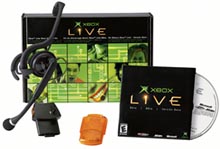
NEW YORK (CNN/Money) - Listen closely. That humming sound you hear is the Microsoft hype machine warming up.
Over the next month and a half, you're going to be hearing a lot about Xbox Live � the online component of the software giant's console gaming system � and for good reason. Microsoft has committed to spending $2 billion on the Xbox over the next five years. A substantial portion of that is on Xbox Live. Before the commercials and promotional activities start, though, I'd like to give you a few firsthand impressions.
For the past five weeks or so, I've been participating in the Xbox Live beta test, putting the system through its paces and regularly humiliating myself publicly. (While I've covered the gaming industry for more than seven years � and have been a gamer since the Pong era � my hand-eye coordination skills are still roughly on par with those of a wombat.)
The experience, for the most part, has been an enjoyable one. Even though I'm regularly on the wrong end of a metaphorical butt-kicking, it's always fun to play console games against someone else. And it's not always convenient to have a friend over. That said, Microsoft (MSFT: Research, Estimates) still faces some significant hurdles before Xbox Live is widely used.
 |
|
| The Xbox Live starter kit |
Good stuff first: Setting up the system is a snap. Even luddites will be able to have Xbox Live up and running in 10 minutes. Pick a user name, enter a credit card number and a few other details and you're good to go.
Lag isn't too bad, which is particularly important when you're playing online. Press a button on your gamepad and you'll see the action instantly on screen. The trick for Microsoft will be ensuring that lag remains a non-issue when the system opens up to a vastly larger player base.
The most noticeable delays are with the voice communicator -- which allows you to talk with your online opponents. It stalls comments by two or three seconds. And while that might make the trash talking a little confusing at times, it's not a real distraction.
Microsoft has made the voice communicator the focus of its limited marketing so far, and that's probably a wise move. The headset is light, comfortable and has good clarity (plus, it has a handy mute button that lets you run silent when you'd like). The only times I had trouble understanding an opponent were when they mumbled. The more players there are, though, the harder it is to distinguish between voices.
If you'd rather not use your own voice while playing, the system lets you pick from a half-dozen or so altered voices, though there will likely be more when Xbox Live launches. It offers you privacy (and, conceivably, lets children and women disguise their identity to avoid being harassed by other gamers), but it comes at the cost of making you harder to understand. In the games I've played, the number of folks using voice masking has been minimal � maybe 10 percent at most.
 |
|
| If you don't like online gaming, you could always be a telemarketer... |
It's easy to think of the communicator as superfluous, but it adds an intimacy to the game that's hard to imagine. After trading light-hearted barbs with a fellow player in NFL2K for a few minutes, I had to remind myself that he was actually hundreds of miles away. Microsoft knows the importance of this gamer interaction and is requiring developers to utilize the communicator in all Xbox Live-enabled titles.
The key to Xbox Live's success with casual gamers lies in its ability to match players of equal abilities. Once you've put your game in the console's DVD drive and connected to the Internet, you're given the choice to join a "Quick Match" � which offers a list of all games being played � or "OptiMatch."
With the OptiMatch option, you can define your gaming experience, deciding the skill level you'd like to face, the length of the game and more. It's a nice touch for gamers new to the online world, because there's nothing more frustrating than constantly finding yourself pitted against a massively superior player.

| |
|
Click Mario for previous columns
|
|
From a useability standpoint, Microsoft may well be setting the standard for online console gaming. The features it offers are masterfully thought-out and organized. Convincing users to sign-up for the service, though, is going to be a challenge.
As much as Xbox Live adds to the gaming experience, it's anything but a sure bet for Microsoft. Consumer interest is debatable. The financial investment on the gamer's part is far above what Microsoft is saying. And the company's goals are ambitious � perhaps overly so. Next week, we'll take a look at some of the pitfalls the company faces as it tries to reshape the console industry.

Morris is Director of Content Development for CNN/Money. Click here to send him an email.
|

